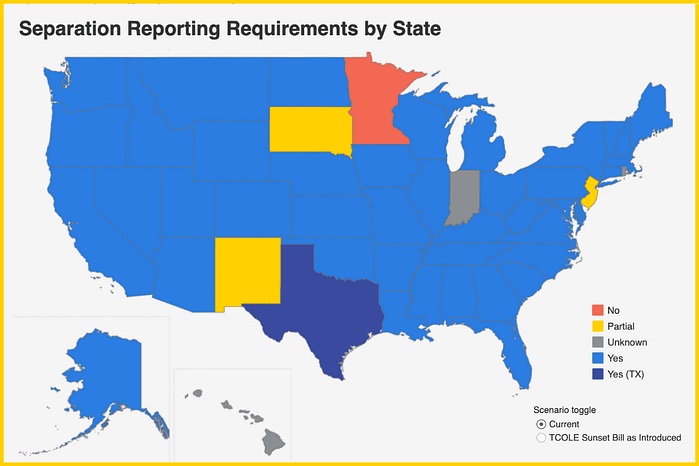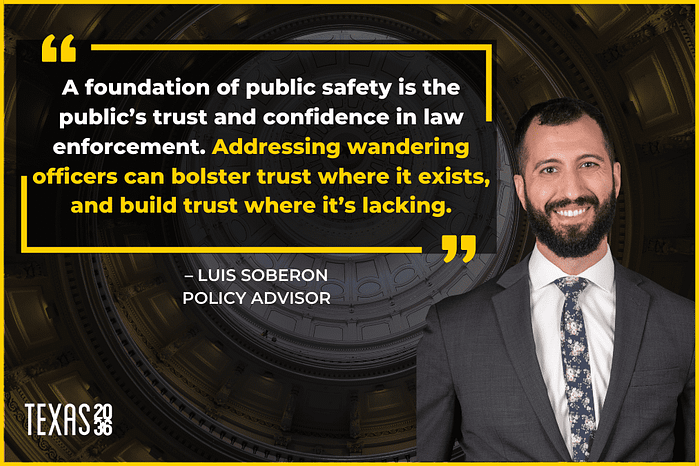Texas Legislature gets serious about justice and safety
This is a preview of our Texas 2036 newsletter about justice and safety in Texas. To receive this weekly highlight of our work, sign up here.

Public confidence in law enforcement is a public safety strategy that depends on transparency, accessibility and accountability. The 88th Legislature has been taking up bills to build upon trust in law enforcement. Here’s what you should know.
Addressing transparency in law enforcement 🚔
Setting the stage: The Texas Commission on Law Enforcement, or TCOLE, oversees more than 2,700 law enforcement agencies, 78,500 peace officers, 22,300 county jailers and 8,800 dispatchers.
- Our report, Texas Law Enforcement Data Landscape, shows that the agency lacks a comprehensive data infrastructure that would lead to more public transparency, trust and safety.
Legislative action: This week, House Bill 4966 by Rep. Ken King, R-Canadian, was heard by the House Committee on Homeland Security & Public Safety.
- The bill focuses on improving practices around law enforcement agency personnel records and standards of hiring and separating peace officers.
Dive deeper: HB 4966 would expand the F-5 separation report from its current discharge designations to a nature and circumstances of separation. It also makes the nature of an officer’s separation—whether retirement, resignation, termination or death—available to the public.
- Currently, the F-5 separation report only includes three classifications—honorable, general or dishonorable—and are upgraded 75% of the time when appealed.
Why this matters: What should be a red flag for future hiring agencies doesn’t work. The F-5 report’s limited transparency prevents lawmakers and the public from seeing the full picture of rehired officers relocating to their communities.
- The system makes no clarification between a peace officer who was fired for criminal misconduct or one who was separated for insubordination and untruthfulness.
- As a result, we may get a wandering officer—a peace officer who is fired or resigns in lieu of getting fired and is then rehired to work in law enforcement at another agency.
👉 Read more: The case for addressing wandering officers after Uvalde

How does Texas’ separation reporting stack up? 🗃
What the data says: 1,400 peace officers were rehired after receiving a dishonorable discharge since fiscal year 2012.
- While they represent a very small fraction of the men and women who serve honorably, wandering officers can cause significant reputational harm to the whole profession and diminish the trust Texans have in their law enforcement.
Texas’ troubles: The current F-5 discharge categories are vague and largely subjective, and the broken appeals process to change an F-5 discharge often helps officers with a bad track record move to new agencies.
- Recent events, from Uvalde to San Antonio, have revealed serious flaws in the state’s reporting requirements for law enforcement agencies when they dismiss a peace officer.
Beyond the Lone Star State: Among 43 states that have reporting requirements for officer separations, the level of detail varies substantially.
- Some states require written explanations, others list more than a dozen different boxes to describe the nature of the separation. For example, Florida has 22 boxes to select. Many other states have a simpler set of boxes from which to choose.
Bottom line: The men and women who serve Texas deserve a regulatory structure and rooted in good data, transparency and accountability.
👉 Compare states: Reporting on wandering officers: How other states handle the issue

Justice and safety: What else to know 📌
Other bills to watch: Senate Bill 1445 by Sen. Angela Paxton, R-McKinney, aims to continue the agency and its functions.
- Watch Policy Advisor Luis Soberon testify on this bill. He noted while there were some positive changes, eliminating F-5 categories means there’s “no way of getting eyes on the wandering officer problem from a data perspective.”
Motor vehicle stop data: Our data landscape report shows a serious need to support an improved data capacity and infrastructure at TCOLE. This also included motor stop vehicles.
- Find out how law enforcement agencies report motor vehicle stop data to TCOLE and how it maintains and publishes that data.
Air conditioning in prisons: The House budget would provide $343.8 million to install prison air conditioning. A lack of it has caused lawsuits against the state, illness and deaths.
- Luis told the Dallas Morning News, this would bring cooling to about one-third of the Department of Criminal Justice’s prison beds, “dramatically improving both the living conditions of incarcerated Texans and the working conditions of the TDCJ staff that serve them.”
Judicial data collection improvement: Both the House and Senate budgets provide funding to the Office of Court Administration to upgrade its legacy data-collection system, which will drastically improve our ability to monitor court backlogs and track key judicial outcomes.
- Last month, Texas 2036 supported HB 841 by Rep. Claudia Ordaz, D-El Paso, requiring the collection of case-level data by the Texas Judicial Council and Office of Court Administration.
Ranking Texas’ Public Safety and Justice System 🔢
 How does Texas rank compared to its 12 peer states when it comes to crime and clearance rates? Our Strategic Framework measures two goals around public safety and the justice system.
How does Texas rank compared to its 12 peer states when it comes to crime and clearance rates? Our Strategic Framework measures two goals around public safety and the justice system.
